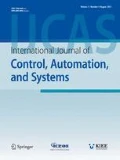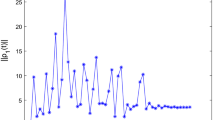Abstract
In this article, we explore the theoretical issues on the drive-response synchronization of a class of fractional order uncertain complex valued neural networks (FOUCNNs) with mixed time varying delays and impulses. Based upon the contraction mapping principle, robust analysis techniques, as well as Riemann-Liouville (R-L) derivative, we derive a new set of novel sufficient conditions for the existence and uniqueness of equilibrium point of such neural network system, while by applying the Lyapunov functional approach, the global stability of the equilibrium solutions are obtained. Furthermore, the synchronization criterion of FOUCNNs is also attracted by means of the adaptive error feedback control strategy. Finally, two examples are provided along with the simulation results to demonstrate the effectiveness of our main proofs.
Similar content being viewed by others
References
H. Bao, J. H. Park, and J. Cao, “Synchronization of fractional–order complex–valued neural networks with time delay,” Neural Networks, vol. 81, no. 1, pp. 16–28, 2016.
A. Carpinteri, P. Cornetti, and M. Kolwankar, “Calculation of the tensile and flexural strength of disordered materials using fractional calculus,” Chaos, Solitons and Fractals, vol. 21, no. 3, pp. 623–632, 2004.
Z. Ding and Y. Shen, “Projective synchronization of nonidentical fractional–order neural networks based on sliding mode controller,” Neural Networks, vol. 76, no. 1, pp. 97–105, 2016.
Y. Gu, Y. Yu, and H. Wang, “Synchronization for fractional–order time–delayed memristor–based neural networks with parameter uncertainty,” Journal of the Franklin Institute, vol. 353, no. 15, pp. 3657–3684, 2016.
E. Kaslik and S. Sivasundaram, “Dynamics of fractionalorder neural networks,” Proc. of the International Conf. Neural Network, California, pp. 611–618, 2011.
W. Li and J. J. E. Slotine, Applied Nonlinear Control, Englewood Cliffs, NJ, 1991.
C. Huang, J. Cao, M. Xiao, A. Alsaedi, and T. Hayat, “Bifurcations in a delayed fractional complex–valued neural network,” Applied Mathematics and Computation, vol. 292, no. 1, pp. 210–227, 2017.
R. Rakkiyappan, K. Udhayakumar, G. Velmurugan, J. Cao, and A. Alsaedi, “Stability and Hopf bifurcation analysis of fractional–order complex–valued neural networks with time delays,” Advances in Difference Equations, vol. 2017. no. 1, ID 225, 2017.
Y. Cao, R. Samidurai, and R. Sriraman, “Robust passivity analysis for uncertain neural networks with leakage delay and additive time–varying delays by using general activation function,” Mathematics and Computers in Simulation, vol. 155, pp. 57–77, 2019.
L. Pecora and T. Carrol, “Synchronization in chaotic systems,” Physical Review Letters, vol. 64, no. 3, pp. 821–824, 1990.
R. Rakkiyappan, G. Velmurugan, and J. Cao, “Finitetime stability analysis of fractional–order complex–valued memristor–based neural networks with time delays,” Nonlinear Dynamics, vol. 78, no. 4, pp. 2823–2836, 2014.
R. Rakkiyappan, G. Velmurugan, and J. Cao, “Stability analysis of fractional–order complex–valued neural networks with time delays,” Chaos, Solitons and Fractals, vol. 78, no. 1, pp. 297–316, 2015.
X. Zhang, X. Lv, and X. Li, “Sampled–data based lag synchronization of chaotic delayed neural networks with impulsive control,” Nonlinear Dynamics, vol. 90, no. 3, pp. 2199–2207, 2017.
R. Rakkiyappan, S. Dharani, and Q. Zhu, “Synchronization of reaction–diffusion neural networks with time–varying delays via stochastic sampled–data controller,” Nonlinear Dynamics, vol. 79, no. 1, pp. 485–500, 2015.
W. Rudin, Real and Complex Analysis, Mcgraw–Hill, Newyork, 1987.
J. Sabatier, O. P. Agrawal, and J. A. T. Machado, Advances in Fractional Calculus, Springer, Dordrecht, 2007.
Q. Song, Z. Zhao, and Y. Liu, “Stability analysis of complex–valued neural networks with probabilistic timevarying delays,” Neurocomputing, vol. 159, no. 2, pp. 96–104, 2015.
I. Stamova, “Global Mittag–Leffler stability and synchronization of impulsive fractional order neural networs with time–varying delays,” Nonlinear Dynamics, vol. 77, no. 4, pp. 1251–1260, 2014.
D.Tripathil, S. Pandey, and S. Das, “Peristaltic flow of viscoelastic fluid with fractional Maxwell model through a channel,” Applied Mathematics and Computation, vol. 215, no. 10, pp. 3645–3654, 2010.
G. Velmurugan, R. Rakkiyappan, and J. Cao, “Finite–time synchronization of fractional–order memristor–based neural networks with time delays,” Neural Networks, vol. 7, no. 1, pp. 36–46, 2016.
F. Wang, Y. Q. Yang, and M. F. Hu, “Asymptotic stability of delayed fractional–order neural networks with impulsive effects,” Neurocomputing, vol.154, no. 22, pp. 239–244, 2015.
X. Li and J. Cao, “An impulsive delay inequality involving unbounded time–varying delay and applications,” IEEE Transactions on Automatic Control, vol. 62, no. 7, pp. 3618–3625, 2017.
X. Yang and J. Cao, “Adaptive pinning synchronization of coupled neural networks with mixed delays and vectorform stochastic perturbations,” Acta Matematica Scientia, vol. 32, no. 3, pp. 955–977, 2012.
X. Yang and J. Cao, “Hybrid adaptive and impulsive synchronization of uncertain complex networks with delays and general uncertain perturbations,” Applied Mathematics and Computation, vol. 227, no. 1, pp. 480–493, 2014.
Z. Wang, J. Cao, Z. Guo, and L. Huang, “Generalized stability for discontinuous complex–valued Hopfield neural networks via differential inclusions,” Proceedings of the Royal Society A, vol. 474, no. 2220. art. no. 2018.507, 2018.
J. Xiao, S. Zhong, Y. Li, and F. Xu, “Finite–time Mittag–Leffler synchronization of fractional–order memristive BAM neural networks with time delays,” Neurocomputing, vol. 219, no. 1, pp. 431–439, 2016.
X. Yang, C. Li, T. Huang, Q. Song, and X. Chen, “Quasiuniform synchronization of fractional–order memristorbased neural networks with delay,” Neurocomputing, vol. 234, no. 1, pp. 205–215, 2017.
X. Li and X. Fu, “Lag synchronization of chaotic delayed neural networks via impulsive control,” IMA Journal of Mathematical Control and Information, vol. 29, no. 1, pp. 133–145, 2012.
X. Li and S. Song, “Stabilization of delay systems: delaydependent impulsive control,” IEEE Transactions on Automatic Control, vol. 62, no. 1, pp. 406–411, 2017.
L. Zhang and Y. Wang, “Complex projective synchronization of complex–valued neural network with structure identifcation,” Journal of the Franklin Institute, vol. 354, no. 12, pp. 5011–5025, 2017.
C. Zhou, W. Zhang, X. Yang, C. Xu, and J. Feng, “Finitetime synchronization of complex–valued neural networks with mixed delays and uncertain perturbations,” Neural Process Letters, vol. 46, no. 1, pp. 1–21, 2017.
W. Zhou and J. M. Zurada, “Discrete–time recurrent neural networks with complex–valued linear threshold neurons,” IEEE Transactions on Circuits and Systems II, vol. 56, no. 8, pp. 669–673, 2009.
Q. Zhu, J. Cao, and R. Rakiappan, “Exponential input–tostate stability of stochastic Cohen–Grossberg neural networks with mixed delays,” Nonlinear Dynamics, vol. 79, no. 2, pp. 1085–1098, 2015.
Q. Zhu and X. Li, “Exponential and almost sure exponential stability of stochastic fuzzy delayed Cohen–Grossberg neural networks,” Fuzzy Sets and Systems, vol. 203, no. 1, pp. 74–94, 2012.
Author information
Authors and Affiliations
Corresponding author
Additional information
Recommended by Associate Editor Ohmin Kwon under the direction of Editor Yoshito Ohta. This work was jointly supported by the Thailand research Grant No.RSA5980019, the Jiangsu Provincial Key Laboratory of Networked Collective Intelligence under Grant No. BM2017002, and Maejo University.
Pratap Anbalagan is currently pursuing a Ph.D. degree in Alagappa University, Karaikudi, Tamil- nadu, India. His current research interests include stability theory of neural networks, fractional-order synchronization neural networks, memristorbased neural networks, complex systems, stochastic and impulsive dynamical systems.
Raja Ramachandran received the M.Sc., M.Phil., and Ph.D. degrees in Mathematics from Periyar University, Salem, India, in 2005, 2006 and 2011, respectively. He served as a Guest faculty at Periyar University, India, after the completion of his doctoral studies. He was the recipient of Sir.C.V. Raman Budding Innovator Award for the year 2010 from Periyar University, India. He is currently working as an Assistant Professor in Ramanujan Centre for Higher Mathematics, Alagappa University, Karaikudi, India. He obtained a grant from UGC for distinguished Young Scientist Award for the year 2013.
Jinde Cao received the B.S. degree from Anhui Normal University, Wuhu, China, the M.S. degree from Yunnan University, Kunming, China, and the Ph.D. degree from Sichuan University, Chengdu, China, all in mathematics/applied mathematics, in 1986, 1989, and 1998, respectively. He is an Endowed Chair Professor, the Dean of School of Mathematics and the Director of the Research Center for Complex Systems and Network Sciences at Southeast University. From March 1989 to May 2000, he was with the Yunnan University. In May 2000, he joined the School of Mathematics, Southeast University, Nanjing, China. From July 2001 to June 2002, he was a Postdoctoral Research Fellow at Chinese University of Hong Kong, Hong Kong. Professor Cao was an Associate Editor of the IEEE Transactions on Neural Networks, and Neurocomputing. He is an Associate Editor of the IEEE Transactions on Cybernetics, IEEE Transactions on Cognitive and Developmental Systems, Journal of the Franklin Institute, Mathematics and Computers in Simulation, Cognitive Neurodynamics, and Neural Networks. He is a Fellow of IEEE, a Member of the Academy of Europe, a Member of European Academy of Sciences and Arts and a Fellow of Pakistan Academy of Sciences. He has been named as Highly-Cited Researcher in Engineering,Computer Science, and Mathematics by Thomson Reuters/Clarivate Analytics. He received the National Innovation Award of China (2017).
Grienggrai Rajchakit received his Ph.D. degree in Applied Mathematics from KMUTT, Bangkok, Thailand. He served as a lecturer at Department of Mathematics Faculty of Science Maejo University, Chiangmai, Thailand. He was the recipient of Thailand Frontier author Award by Thomson Reuters Web of Science in the year 2016. His research interests include differential equations, neural networks, robust nonlinear control, stochastic systems, stability analysis of dynamical systems, synchronization and chaos theory.
Chee Peng Lim received his Ph.D. degree from Department of Automatic Control and Systems Engineering, The University of Sheffield, UK, in 1997. His research interest includes theory and application of computational intelligence-based systems for data analytics, pattern classificaiton, condition monitoring, optimization, and decision support. He has published more than 280 technical papers in journals, conference proceedings, and books, received 7 best paper awards, edited 3 books and 12 special issues in journals, and served in the editorial board of 5 international journals.
Rights and permissions
About this article
Cite this article
Anbalagan, P., Ramachandran, R., Cao, J. et al. Global Robust Synchronization of Fractional Order Complex Valued Neural Networks with Mixed Time Varying Delays and Impulses. Int. J. Control Autom. Syst. 17, 509–520 (2019). https://doi.org/10.1007/s12555-017-0563-7
Received:
Revised:
Accepted:
Published:
Issue Date:
DOI: https://doi.org/10.1007/s12555-017-0563-7




